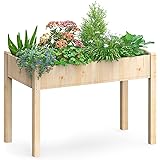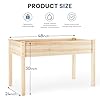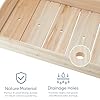Gardmax 2 Pack Galvanized Raised Garden Bed, Lightweight Planter Boxes Outdoor with Easy Assembly, Large Garden Bed for Vegetables, Fruits, Flower Silver
$52.99 ($26.50 / Count) (as of 14:00 GMT -05:00 - More infoProduct prices and availability are accurate as of the date/time indicated and are subject to change. Any price and availability information displayed on [relevant Amazon Site(s), as applicable] at the time of purchase will apply to the purchase of this product.)DUMOS Raised Garden Bed with Legs, 48x24x30in Wood Elevated Planter Box w/Bed Liner for Herbs Flowers Vegetables, 300lbs Capacity Outdoor Gardening Planters for Patio Balcony Backyard, Natural Wood
12% OffComposting is a natural process that involves the decomposition of organic matter, such as food scraps and yard waste. During this process, bacteria, fungi, and other microorganisms break down these materials into smaller pieces, which eventually turn into nutrient-rich soil known as compost. Composting not only helps reduce the amount of waste sent to landfills but also provides numerous benefits for your garden and the environment. Here are some reasons why you should consider starting a compost pile in your backyard:
What is Composting and How Does it Work?
Composting is an eco-friendly way to dispose of household waste while creating rich fertilizer for your plants. The process begins with collecting organic material like fruit peels, vegetable scraps, eggshells, coffee grounds, leaves, twigs, and grass clippings. Once you have gathered all the ingredients, mix them together in a container or bin, making sure to include both green (nitrogen-rich) and brown (carbon-rich) materials. Turn the mixture regularly to aerate it and speed up the decomposing process. In a few weeks’ time, you will start seeing the first signs of composting, including heat generation and the formation of a crusty layer on top of the pile. With proper maintenance, your compost pile will be ready to use in about six months.
The Environmental Benefits of Composting
One of the most significant advantages of composting is its ability to reduce the amount of waste going to landfills. When organic waste ends up in a landfill, it produces methane gas, which is a potent greenhouse gas that contributes to global warming. By composting your kitchen and yard waste, you can prevent the release of methane and help reduce your carbon footprint. Additionally, using compost instead of synthetic fertilizers reduces the need for chemicals that can harm the environment.
Tips for Starting Your Own Compost Pile
Starting a compost pile may seem daunting at first, but it’s relatively easy once you know what to do. First, choose a location for your compost pile that receives plenty of sunlight and has good drainage. You can build a simple wooden frame to contain the pile or use a plastic bin with holes poked in the sides for ventilation. Next, gather your organic materials and mix them together in a ratio of two parts brown to one part green. Make sure to keep the pile moist but not too wet, and turn it every week or so to aerate it. Finally, wait patiently for the magic of composting to happen!
Using Compost to Improve Soil Health in Your Garden
Once your compost pile is complete, you can spread the finished product onto your garden beds to improve soil health. Compost adds essential nutrients to the soil, including nitrogen, phosphorus, and potassium, which promote plant growth and development. It also improves soil structure by increasing its ability to retain water and air, reducing erosion and compaction. As a result, your plants will grow stronger and healthier, requiring less water and fertilizer over time.
Common Mistakes People Make When Composting
Even though composting is a straightforward process, there are several mistakes people often make when starting their own piles. One common mistake is not mixing the right ratios of browns and greens, leading to slow decomposition or odor problems. Another issue is not turning the pile frequently enough, causing it to become soggy or attract pests. Lastly, some people forget to add enough water to the pile, resulting in dry, unusable compost. Avoid these pitfalls by doing your research and following best practices for successful composting.
In conclusion, composting offers many benefits for your garden and the environment. Not only does it provide a natural source of fertilizer, but it also reduces waste and lowers your carbon footprint. Start your own compost pile today and see how much better your plants grow with the power of compost!

Related Content
- Hollywood workers revolt and human composting – Late Night Live – ABC Radio National
- How to Keep Your Home Eco-Friendly Based On Scandanavian Principles
- Wastewise appoints Ian Morrish as new Managing Director
- Waste avoidance
- Charlottesville residential recycling services status update – Augusta Free Press














































